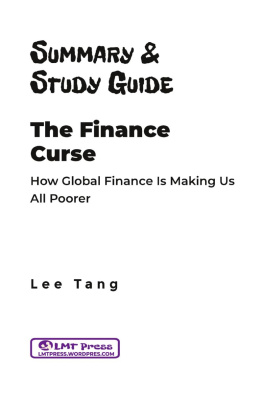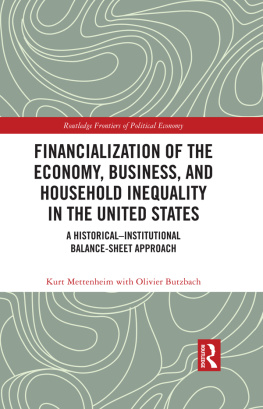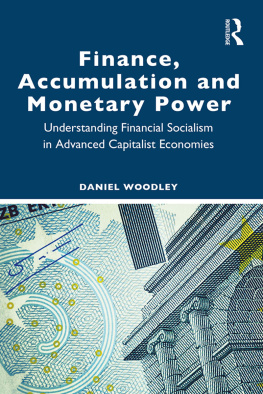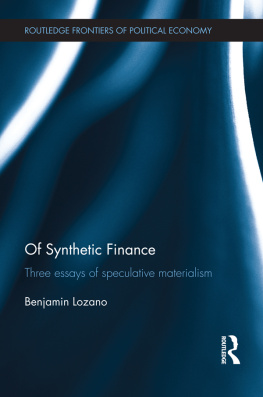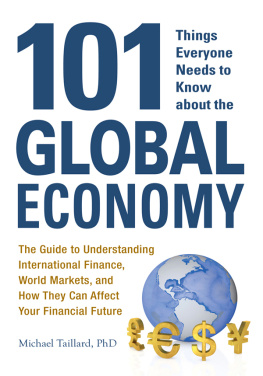Timothy J. Sinclair - To the Brink of Destruction
Here you can read online Timothy J. Sinclair - To the Brink of Destruction full text of the book (entire story) in english for free. Download pdf and epub, get meaning, cover and reviews about this ebook. publisher: Lightning Source Inc. (Tier 3), genre: Romance novel. Description of the work, (preface) as well as reviews are available. Best literature library LitArk.com created for fans of good reading and offers a wide selection of genres:
Romance novel
Science fiction
Adventure
Detective
Science
History
Home and family
Prose
Art
Politics
Computer
Non-fiction
Religion
Business
Children
Humor
Choose a favorite category and find really read worthwhile books. Enjoy immersion in the world of imagination, feel the emotions of the characters or learn something new for yourself, make an fascinating discovery.

- Book:To the Brink of Destruction
- Author:
- Publisher:Lightning Source Inc. (Tier 3)
- Genre:
- Rating:3 / 5
- Favourites:Add to favourites
- Your mark:
- 60
- 1
- 2
- 3
- 4
- 5
To the Brink of Destruction: summary, description and annotation
We offer to read an annotation, description, summary or preface (depends on what the author of the book "To the Brink of Destruction" wrote himself). If you haven't found the necessary information about the book — write in the comments, we will try to find it.
To the Brink of Destruction — read online for free the complete book (whole text) full work
Below is the text of the book, divided by pages. System saving the place of the last page read, allows you to conveniently read the book "To the Brink of Destruction" online for free, without having to search again every time where you left off. Put a bookmark, and you can go to the page where you finished reading at any time.
Font size:
Interval:
Bookmark:
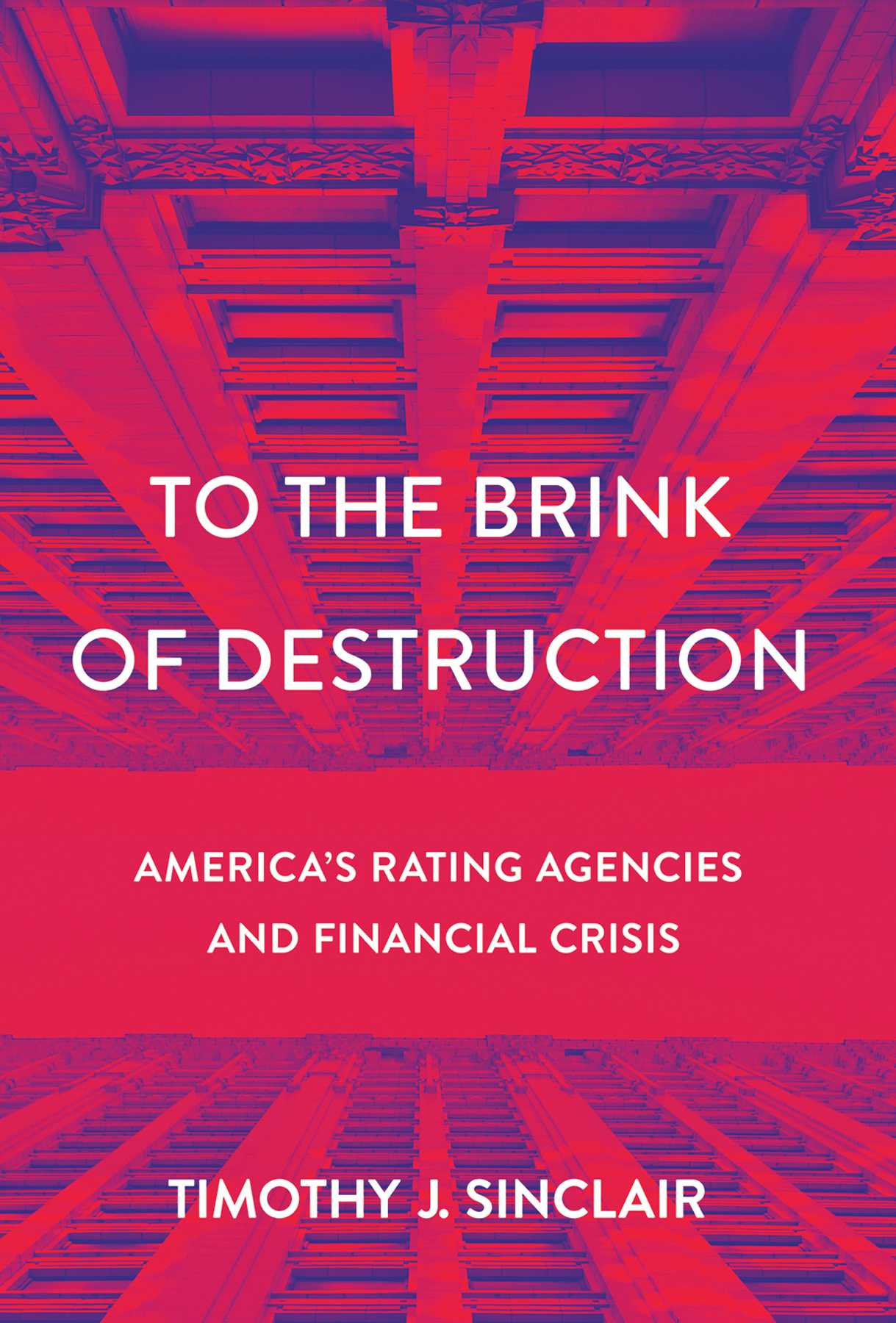
To the Brink of Destruction
Americas Rating Agencies and Financial Crisis
Timothy J. Sinclair
Cornell University Press
Ithaca and London
For Owen and Simon
T he publication of this book is the most recent product of thirty years of thinking, talking, and writing about Americas rating agencies. When I started this work, I did not appreciate the degree to which rating would become such a major feature of the global financial system. If the shift from traditional bank lending to capital markets is the long-run trend, as I think it is, then many judgments in our financial system will likely increasingly occur in the Big Three, comprising Moodys, S&P, and Fitch.
Most scholars have one opportunity to offer their views about some phenomenon that puzzles them. But to consider something over the long term, to observe change, to revise your thinking, is potentially a great benefit to understanding. Because I had the luck to investigate something that became increasingly important over time, and because these institutions have been involved in some of the most catastrophic events in financial markets and associated politics since the end of World War II, I hope readers will agree it made sense for me to write this new book on the agencies.
Working on this book happily took me back to New York City, staying at the now sadly defunct Larchmont Hotel on West 11th Street in the West Village. This time, I made extensive use of the Rose Main Reading Room at the New York Public Library at Bryant Park. This served as a base for field work expeditions to the financial district and elsewhere. At the time, the library also provided a room for scholars, which I used for some of the meetings that informed this book.
Field work in New York, Paris, and London was supported by a British Academy / Leverhulme Small Research Grant, SG131031, for which I am thankful to the British Academy and Leverhulme Trust. Gary Fisher gave excellent advice on the application. Jackie Clarke helped make supporting funds available from the Department of Politics and International Studies at the University of Warwick. Jill Pavey helped me greatly in administering the grant.
At Moodys, I would like to thank Ryan Mensing, Janet Holmes, Nigel Phipps, and Nicola Fleming. At Standard & Poors, I am most thankful to Catherine J. Mathis, Jayan Dhru, and James Wiemken for their time and insights. At Fitch, I was very lucky to meet with Ian Linnell in 2014 and 2020. Ians executive assistant, Joanne Ridge Sims, arranged all this with professionalism and courtesy, despite the pandemic complicating matters. Jermone Fons, formerly of Moodys but then at Kroll Bond Rating Agency, talked to me at length. I met with Ann Rutledge of CreditSpectrum, also ex-Moodys, several times in New York, to my great benefit. Bill Harrington, yet another former Moodys staffer, shared his acute insights with me many times. I discussed some of the issues in this book with David Levey, who retired from Moodys as Managing Director and Co-head of the Sovereign ratings unit in 2005. David had a central role in creating Moodys country credit analysis methodology. As in the past, he was a font of insight and wisdom. In Paris, Raquel de Julian Artajo, Nadia El Gharbi, and Thierry Sessin-Caracci of ESMA (the European Securities and Markets Authority) kindly invited me to participate in a brown bag lunch at their offices.
I had long discussions with Bart Paudyn, Fumihito Gotoh, Giulia Mennillo, and Ginevra Marandola while thinking through some of the arguments made in this book. Bart visited the University of Warwick in 2011. Fumihito Gotoh, a former doctoral student of mine and now a colleague, who benefits from twenty-five years of credit research experience in Tokyo, wrote an article with me on rating in Japan. Dr. Gotoh also served as rapporteur at the workshop on the manuscript of this book held at the University of Warwick in January 2019. Giulia and I wrote an article on the regulation of rating. Dr. Mennillos book on rating is an excellent introduction to the political economy of rating agencies. Dr. Marandola and I wrote a book chapter together that draws on some thoughtful parallels she developed between credit rating and the world of restaurant ratings. Ginevra, who visited Warwick in 2012/2013, during her doctoral studies at the University of Rome Tor Vergata, drew my attention to the repeal of a key feature of Dodd-Frank, which is discussed in this book. Tobias Hoffarth, a graduate student at the University of Warwick, was an effective research assistant, helping gather information on rating regulation.
My colleague Matthew Clayton helped me in what proved to be two very important ways. When I was wondering about what idiom to adopt, he gave me sage advice that has made the text of this book stronger, and I hope, more interesting to others. He also suggested I organize the manuscript workshop that took place at Warwick in January 2019.
The manuscript workshop, which examined the first draft over several hours, included comments and questions by Paul Langley (Durham), Peter Burnham (Birmingham), and a host of Warwick colleagues, including Ben Clift, Chris Clarke, Nina Boy, Johannes Petry, Fumihito Gotoh, Iain Pirie, Ruben Kremers, and Fabian Pape. I must thank Paul for sharing his story about my driving. This event turned out to be a key step in the development of the book, and I thank everyone who participated in different ways. I recommend a manuscript workshop to other authorsprovided, of course, they have a thick skin.
In addition to the various published papers I have authored and coauthored in recent years, the thinking presented in this book developed through public lectures and academic talks given at the Graduate Institute Geneva, the Financial Crises as Global Challenges symposium in Hannover, at Carleton University, the University of Leeds, the University of Erfurt, the Justus Liebig University Giessen, the University of York, Copenhagen Business School, the University of Birmingham, the University of Sheffield, and the University of Lund.
Tony Payne kindly made it possible for me to spend 2013/14 as a visiting scholar at the Sheffield Political Economy Research Institute at the University of Sheffield. I want to thank Koen Lamberts, the President and Vice-Chancellor of the University of Sheffield, whom I met when he worked at the University of Warwick, and Chris Hughes, Pro-Vice-Chancellor and formerly head of the Department of Politics and International Studies at Warwick. There is a good chance this book might never have been written without their encouragement and facilitation.
I want to thank Roger Haydon for being the most encouraging and exacting editor imaginable. I hope this book was a little easier for him than my first one. Roger, the leading social science editor of his time, retired from Cornell University Press just as I was making the finishing touches to the manuscript prior to it going into production. He made a huge difference to scholarship in the social sciences by nurturing several generations of young scholars. Rogers deep understanding and thoughtful guidance will be sorely missed. At the Press, I also want to thank Ellen Labbate, who prepared the manuscript for the editing and production departments, and Emily Andrew, who took over the Money series from Roger.
Eric Helleiners gentle encouragement and pointed comments were also instrumental in the development of the text. I wish to also thank the anonymous peer reviewers and the editorial board, who could see what I was doing but gave me some useful ideas that have strengthened the book.
Font size:
Interval:
Bookmark:
Similar books «To the Brink of Destruction»
Look at similar books to To the Brink of Destruction. We have selected literature similar in name and meaning in the hope of providing readers with more options to find new, interesting, not yet read works.
Discussion, reviews of the book To the Brink of Destruction and just readers' own opinions. Leave your comments, write what you think about the work, its meaning or the main characters. Specify what exactly you liked and what you didn't like, and why you think so.

